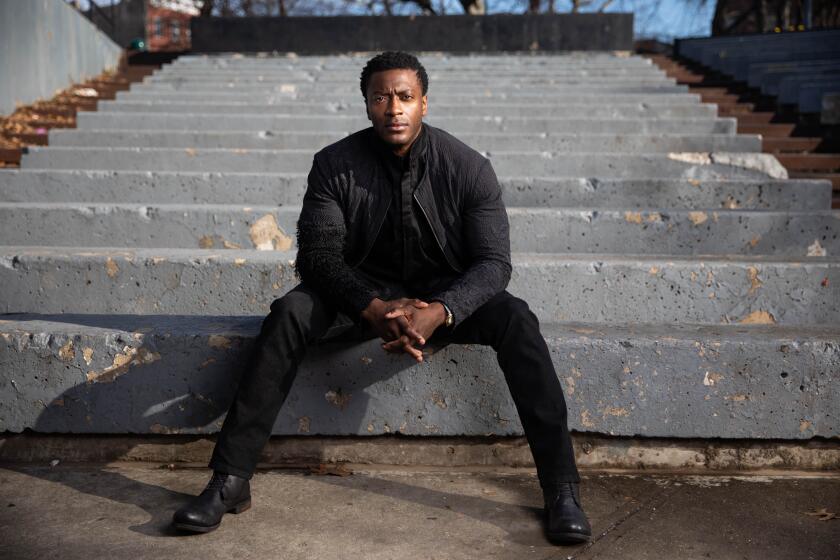Column: âOne Night in Miamiâ doesnât acknowledge Jim Brownâs history of violence. But we must
âOne Night in Miamiâ is a fictional account.
This was made clear in reviews of the play when it debuted in 2013 as well as the film it begat in 2020. âOne Night in Miami is a fictional accountâ are the first words of the filmâs brief description on its Amazon Prime homepage. When you push play, âInspired by true eventsâ are the first words that appear on screen for the feature directorial debut of Oscar-winning actress Regina King.
Feb. 25, 1964, is the night screenwriter Kemp Powers dared to reimagine with his what-if conversation among Cassius Clay, Malcolm X, Sam Cooke and Jim Brown. He paints a picture capturing the four, who were all friends in real life, just before each manâs life takes a significant turn. For Clay (Eli Goree), it was just before joining the Nation of Islam and becoming Muhammad Ali even as X (Kingsley Ben-Adir) was departing the organization. Cooke (Leslie Odom Jr.) was realizing the true power of his voice, and Brown (Aldis Hodge) was planning his transition from the NFL to Hollywood.
The exchanges are riveting, presenting questions that in many ways remain unanswered today. The film reveals the complexity in the four iconic men that usually escapes pop cultureâs attempts to tell their stories. There is doubt. There is anxiety. Humor.
And it is fictional.
But there is a real-life conversation slowly brewing about the veracity of the filmâs storytelling â specifically its portrayal of Brown, arguably the NFLâs greatest running back. Brown, who was voted to the Pro Bowl each of his nine seasons, retired at 29 to launch a successful acting career. He also emerged as a strong voice during the civil rights movement, joining Ali, Bill Russell, Kareem Abdul-Jabbar and others for the Cleveland Summit in 1967.
For many, Brown is a hero.
For many others, he is a woman beater.
For me, he is both â a complicated figure who was as brave as he was cowardly.
My mother, a close friend and a favorite aunt were all victims of domestic violence. The issue is back in the headlines again this week as the NFLâs Chad Wheeler has been accused of choking his girlfriend to the point of losing consciousness, according to a police report obtained by ESPN. It is disgusting, and I will never grant a pass to Brown for attacking women. He faced domestic violence charges five times, including one charge of assault with intent to commit murder (a charge that was dismissed), before being found guilty of misdemeanor vandalism for smashing the windows of his wifeâs car in 1999. His short fuse and bullying are insinuated multiple times in the film, but at no point is his future record of domestic violence made clear.
Kingsley Ben-Adir, Eli Goree, Aldis Hodge and Leslie Odom Jr. give beautifully harmonized performances in this adaptation of Kemp Powersâ stage play.
In a #MeToo world, that omission is glaring, especially considering the film is based on one night, yet King and Kemp included several powerful moments involving each man that clearly occurred later in their lives. They opted not to show Brown hitting women â and for many people, particularly women aware of his past, that was a mistake.
I do not know why that decision was made.
My best guess is the filmmakers wanted the audience to keep its focus on the themes being discussed rather than the personal lives of the men discussing them, although divorcing the two is nearly impossible. After all, they are all larger-than-life figures â even in death in the cases of Ali, Cooke and X. It is because of the cultural and political space they claimed and still occupy today that this account is so compelling.
This fictitious account.
I reiterate the nature of âOne Nightâ not to whitewash anyoneâs real-life shortcomings but rather to highlight the tendency to run any film that depicts Black lives from a Black perspective through a purity test. An exercise, mind you, that is not as prevalent when it comes to other fictitious movies inspired by true events. For example, Ava DuVernayâs âSelmaâ faced criticism regarding historical accuracy that Steven Spielbergâs âLincolnâ largely escaped.
Iâve always found it comical when critics expect an industry that made John Wayne a Mongolian ruler and Al Pacino a Cuban drug lord to double as the public library. An industry that often takes a city as diverse as New York and scrubs it clean of any visual representation of being so in telling the story of a group of âFriends.â
On the fictionalized retelling of the meeting of giants, Hodge says, âThatâs one of the most powerful elements of this film, that it shows how you understand somebodyâs pain.â
It is a disconnect to require a fictional film to do something many of us have a hard time doing in real life â tell the truth, the whole truth and nothing but the truth.
And it is particularly tone deaf to be in the year 2021 and not consider that some Black storytellers might fear that an important tale featuring complicated Black people could be hamstrung by their complications.
We have all borne witness, time and time again, when a person of color is shot or killed by law enforcement, to how quickly we are informed of all of their imperfections. Any previous arrests (no matter how irrelevant), missed child support payments, expulsions from school â every blemish on their ledger rapidly weaponized in an effort to justify an injustice by first discrediting the offended. It is an insidious practice â a not-too-distant cousin of the question âWhat was she wearing?â when some speak of victims of sexual assault â that shapes the lens of those who dare try to tell stories of the Black experience.
This is why Claudette Colvin, the 15-year-old arrested in 1955 for not giving up her seat to a white woman on a segregated bus â nine months before Rosa Parks â was not used as a symbol. Colvin was a teenage mother, and civil rights leaders feared that status would be used to discount her grievance. This dynamic is also why Martin Luther King Jr. was so fearful of his extramarital affairs becoming public, an aspect of his life explored in the documentary released earlier this month, âMLK/FBI.â
Generally speaking, we demand perfection from those who dare to call out injustice â as unrealistic as that is. But this is particularly true when it comes to the stories of Black people whose grievances over the decades have often been met with cynical respectability politics, as if speaking the Kingâs English or pulling our pants up has ever inoculated anyone from the disease of racism.
âOne Night in Miamiâ does not provide much insight into Brownâs violence against women. Instead it opts to focus on a conversation that didnât happen in hopes of sparking conversations that must. None of which suggests Brown does not deserve our criticism; he absolutely does. But he is more than just his sins, and there must be space in storytelling to show that too.
More to Read
Only good movies
Get the Indie Focus newsletter, Mark Olsen's weekly guide to the world of cinema.
You may occasionally receive promotional content from the Los Angeles Times.












